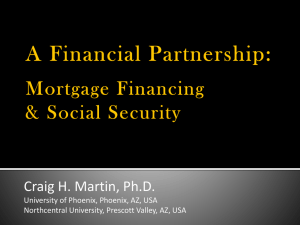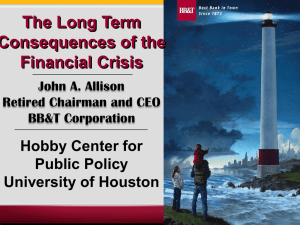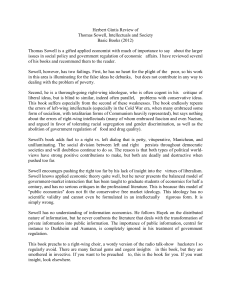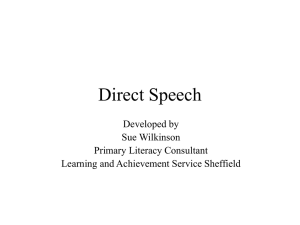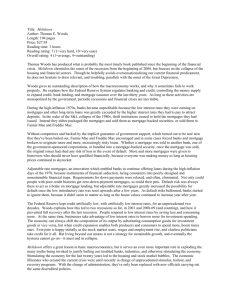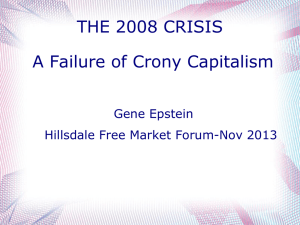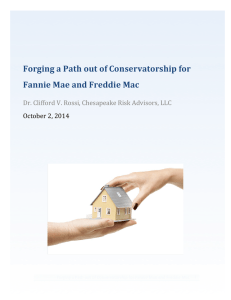Review of Thomas Sowell, The Housing Boom and Busy Basic
advertisement
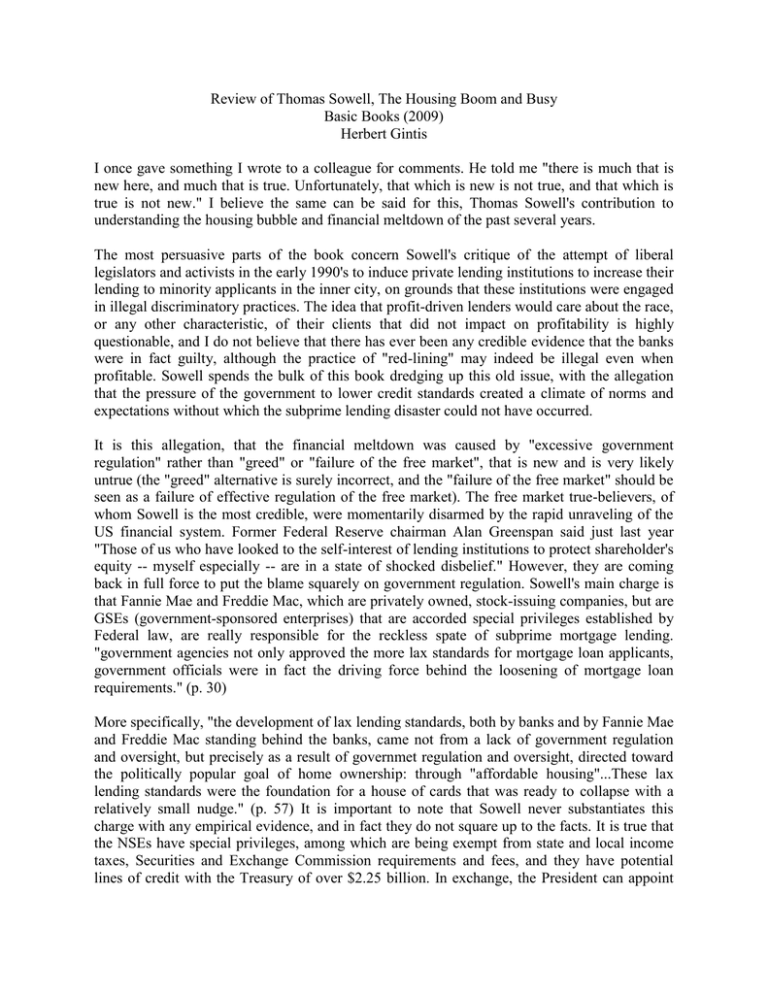
Review of Thomas Sowell, The Housing Boom and Busy Basic Books (2009) Herbert Gintis I once gave something I wrote to a colleague for comments. He told me "there is much that is new here, and much that is true. Unfortunately, that which is new is not true, and that which is true is not new." I believe the same can be said for this, Thomas Sowell's contribution to understanding the housing bubble and financial meltdown of the past several years. The most persuasive parts of the book concern Sowell's critique of the attempt of liberal legislators and activists in the early 1990's to induce private lending institutions to increase their lending to minority applicants in the inner city, on grounds that these institutions were engaged in illegal discriminatory practices. The idea that profit-driven lenders would care about the race, or any other characteristic, of their clients that did not impact on profitability is highly questionable, and I do not believe that there has ever been any credible evidence that the banks were in fact guilty, although the practice of "red-lining" may indeed be illegal even when profitable. Sowell spends the bulk of this book dredging up this old issue, with the allegation that the pressure of the government to lower credit standards created a climate of norms and expectations without which the subprime lending disaster could not have occurred. It is this allegation, that the financial meltdown was caused by "excessive government regulation" rather than "greed" or "failure of the free market", that is new and is very likely untrue (the "greed" alternative is surely incorrect, and the "failure of the free market" should be seen as a failure of effective regulation of the free market). The free market true-believers, of whom Sowell is the most credible, were momentarily disarmed by the rapid unraveling of the US financial system. Former Federal Reserve chairman Alan Greenspan said just last year "Those of us who have looked to the self-interest of lending institutions to protect shareholder's equity -- myself especially -- are in a state of shocked disbelief." However, they are coming back in full force to put the blame squarely on government regulation. Sowell's main charge is that Fannie Mae and Freddie Mac, which are privately owned, stock-issuing companies, but are GSEs (government-sponsored enterprises) that are accorded special privileges established by Federal law, are really responsible for the reckless spate of subprime mortgage lending. "government agencies not only approved the more lax standards for mortgage loan applicants, government officials were in fact the driving force behind the loosening of mortgage loan requirements." (p. 30) More specifically, "the development of lax lending standards, both by banks and by Fannie Mae and Freddie Mac standing behind the banks, came not from a lack of government regulation and oversight, but precisely as a result of governmet regulation and oversight, directed toward the politically popular goal of home ownership: through "affordable housing"...These lax lending standards were the foundation for a house of cards that was ready to collapse with a relatively small nudge." (p. 57) It is important to note that Sowell never substantiates this charge with any empirical evidence, and in fact they do not square up to the facts. It is true that the NSEs have special privileges, among which are being exempt from state and local income taxes, Securities and Exchange Commission requirements and fees, and they have potential lines of credit with the Treasury of over $2.25 billion. In exchange, the President can appoint five of their eighteen board members. The most important effect of their Federal charters is, however, the implicit understanding that the Federal government would never permit Fannie Mae or Freddie Mac to fail, whatever the state of their portfolio. Sowell's point is that this implicit guarantee appears to place stockholders in a no-lose situation in which they can take great risks with subprime mortgages and reap the profits when things go well, but can offload their losses to the taxpayer when things go bad. Were this true, there is no doubt but that these the two GSEs would take on otherwise highly unprofitable levels of risk. This is the received wisdom, but in fact, stockholders have been clobbered by the financial meltdown, and stock prices in these two institutions have fallen to near zero. Stockholders understood that the institutions would be saved, but their stock values would not be immune from steep decline. Moreover, just as housing prices began to increase rapidly several years ago, Federal regulators, responding to GSE accounting scandals, placed serious restraints on their ability to assume high-risk debt. Indeed, by definition these GSEs did not engage in subprime lending because their legal statutes prohibited them from issuing mortgages without substantial down payments and closely validated assurances concerning family income and wealth. [Professor Russell Roberts (Economics, George Mason University) commented on this point in personal communication: "As far back as 1999, Fannie and Freddie were using subprime mortgage purchases and the purchases of subprime backed MBS to satisfy their HUD requirements to purchase "affordable" mortgages, a requirement that began in the Clinton administration and that Bush continued with equal if not greater zeal. This has been documented by both the NYT and the Washington Post though without much detail. I've read through the annual reports of Fannie and Freddie where they admit in the early 2000s that subprime mortgages typically amount to 17% of their book of business--which amounts to hundreds of billions of dollars in some years. Edward Pinto, former CFO of one of them claimed in Congressional testimony that they were actually even more involved than this. I am skeptical of both of these claims to some extent. Informed folks have told me that the annual reports of Fannie and Freddie may be essentially fictional. And I'm not sure that Pinto's analysis is verifiable or accurate. Either way, it's clear and undeniable that Fannie and Freddie were non-trivial players in the subprime market. But how signficant is their involvement? Very hard to tell. While I've suggested that the above story may be important, it is mitigated (as is Sowell's story) by the fact that Ireland and Spain and South Africa (I think) also had housing bubbles. Did they have governmentmandated expansion into the low-income sector? I suspect not. So all of the domestic explanations have to answer the magnitude question. Surely Fannie and Freddie contributed to the problem. But you have to establish the magnitude.] Indeed, Fannie Mae and Freddie Mac began to recede from the forefront of mortgage lending when the housing bubble emerged in the years after 2003. Fannie Mae and Freddie Mac executives panicked when their positions in mortgage markets began to deteriorate, and they introduce questionably legal procedures ("expanded approval" for Fannie Mae and "A minus" for Freddie Mac) to recapture market share. But these efforts were basically unsuccessful because the GSE lenders were saddled with fixed-rate loan structures. The share of GSEs in the mortgage market faded rapidly in the latter years of the housing bubble. Note that before being taken over by the government, the GSEs were private, market-oriented, investor-owned companies, and their behavior in excessive risk-taken was, if anything, less pronounced that the rest of the private financial sector. Nor did any Federal legislation, including the Community Investment Act of 1977, require that banks take on subprime assets. As Richard Posner says in his recent book on the subject, "the pressure exerted by the government to lower lending standards was a case of pushing on an open door...Banks wanted to make risky mortgage loans.' Indeed, never during the housing bubble dynamics did they protest that they were forced to behave irresponsibly. "The critical role of government in the crisis," Posner concludes, was one of permission rather than encouragement." (p. 242) In other words, the financial meltdown of 2007 and after was a failure of coherent regulation, not government meddling. Sowell's book, in short, is very useful for his analysis of the "affordable housing" movement, but only the free-market fundamentalists will find his analysis of the current crisis appealing. The current crisis is in fact a failure of appropriate regulation. The finance sector developed over the past decade a number of novel financial instruments, including credit default swaps, that could be bought, sold, and traded without the usual constraints (especially limitations on reserve requirements). The Garn-St. Germain act of 1982, which dropped New Deal era banking constraints, made this sort of innovation possible, and countries (e.g. Canada) that retained similar controls enjoyed stable banking sectors despite the US financial crisis. The intense short-sidedness of the financial sector, itself a product of the industry's incentive structure, plus the power of banks to shop for auditors who would overlook the shakiness of the newly minted asset-types, allowed the financial sector to spiral out of control. The idea that the government's entanglement with GSE's is a key element in precipitating the crisis is just not plausible. Incidentally, Sowell himself is not a free-market true believer (indeed, no one who has carefully studied modern economic theory could be), but rather a believer in the proposition that the government is rarely an effective regulator of the market, so should stay out of regulation under most conditions. This is not a bad thought, but it does not apply to the financial sector, which has shown itself to operate well only when regulated well. Please do not infer from my assessment of Sowell's argument that I am a crusader for heavy regulation of the financial sector. I am not. I think that countries that dropped New Deal type regulations in the 1980s were correct to do so (this includes the US and Britain), because this led to many years of furious innovation and almost full employment. The failure of regulation occurred in the past decade, where the stupidity and avarice of politicians equalled if not exceeded that of financial sector operatives. The private sector operatives at least have the excuse that they were merely doing what competition dictated (I believe this is the case---see Richard Posner's new book on the topic for a cogent defense), whereas the politicians should have known better, and their economic advisors should be relegated to teaching in Jr. High School on the basis of their shockingly poor perspective on the situation. I would love to see Larry Summers and Alan Greenspan teaching twelve year olds for a few years (Wittgenstein did it, and it made him a lot more reasonable and creative). For a careful assessment of the history of financial regulation in the US, see Moss, David A. (2004). When All Else Fails: Government as the Ultimate Risk Manager. Harvard University Press. ISBN 0-674-01609-2. http://www.amazon.com/dp/0674016092/. Moss notes that from 1792 to the Great Depression in 1933, financial crises occurred about every 15 to 20 years. Between 1933 and the mid-1980s there were no financial crises at all. This period of financial calm was largely the product of strong financial regulation, starting with the Glass-Steagall Act of 1933 and the Banking Act of 1935. The framers of these measures realized important economic regularities. For instance, federal deposit insurance would stop the threat of bank runs, but would lead banks to take excess rist, as they would be undisciplined by their depositors. Hence, these Acts included safeguards against excessive risk-taking. When these safeguards were largely dismantled in the 1980s and in the current era, the reappearance of financial fragility was assured, starting with the Savings and Loan debacle of the mid-1980s. I am not arguing that we need iron-fist financial regulation. Far from it. I am arguing that the ideologues who believe that no regulation is the best regulation are just as much our enemies as those who would nationalize the financial system and replace financial experts with Citizens Councils.
